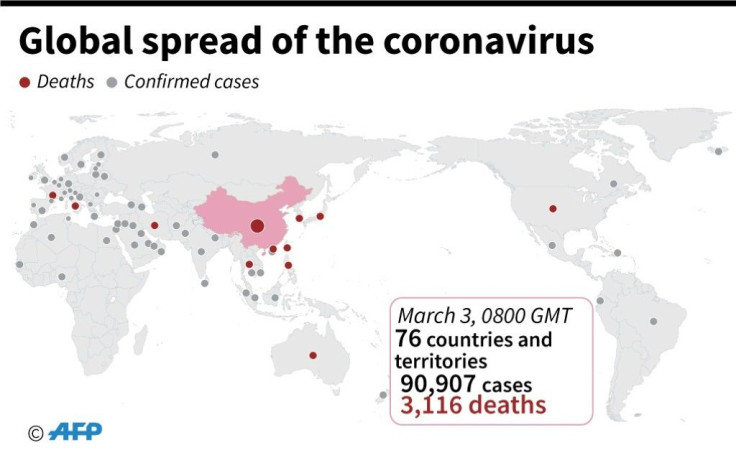Did Chinese Censorship Make The Coronavirus Outbreak Worse? Researchers Examine Latest Data

KEY POINTS
- Doctors first became aware of COVID-19 in early December
- Words like "Wuhan seafood market" and "unknown Wuhan pneumonia," as well as symptoms were censored on YY and WeChat
- Chinese officials did not reveal the virus could pass person-to-person until nearly two months after it was identified
Researchers at the University of Toronto reported Tuesday China suppressed news about the coronavirus for weeks, likely exacerbating the spread of the infection beyond its borders and inhibiting doctors from effectively treating those who were sickened.
“What makes this case unique is the potential public health harm blocking this information may have," Lotus Ruan, a researcher at the university’s Citizen Lab, told AFP.
As of Monday, the World Health Organization reported nearly 89,000 cases worldwide, with more than 3,000 deaths in 64 countries. COVID-19 got its start in a seafood market in Wuhan, China, in December but the doctor who first raised concerns was detained, and censors swung into action to keep information off the internet.
“Expelling our journalists exposes, once again, the governance issue that led to SARS, and now, the coronavirus, namely censorship. It can have deadly consequences,” Secretary of State Mike Pompeo said last week. “Had China permitted its own and foreign journalists and medical personnel to speak and investigate freely, Chinese officials and other nations would have been far better prepared to address the challenge.
The researchers conducted censorship tests on YY and WeChat, with more than 1 billion active users who rely on the app for information and communication. Doctors use WeChat to secure professional knowledge from peers.
The censorship tests revealed words like “unknown Wuhan pneumonia” and “Wuhan seafood market,” as well as symptoms and references to SARS, were blocked on the platforms.
“Between January and February 2019, as the outbreak spread, a wide breadth of content related to COVID-19 was censored on WeChat [China’s most popular chat app], including criticism of the Chinese government, speculative and factual information related to the epidemic, and neutral references to Chinese government efforts to handle the outbreak that had been reported on state media,” the researchers reported.
“Because of social media’s integral role in Chinese society and its uptake by the Chinese medical community, systematic blocking of general communication on social media related to disease information and prevention risks substantially harming the ability of the public to share information that may be essential to their health and safety,” the researchers said.
When the government finally started to take action, the researchers said Chinese officials continued to control how much information was released. Local authorities in Wuhan “silenced and punished” two doctors who tried to warn the public on Dec. 30, accusing them of spreading rumors and “disturbing the social order.”
The Cyberspace Administration of China warned internet platforms and websites as well as individuals against “spreading fear” and threatened punishment.
China did not reveal COVID-19 could be spread person-to-person until Jan. 20, nearly two months after the disease was first detected, allowing it to spread unimpeded.
“Leaked directives and previous research show that Chinese social media companies receive greater government pressure around critical or sensitive events. While it is not known what specific directives on COVID-19 may have been sent down from the government to social media companies, our research suggests that companies received official guidance on how to handle it as early as December 2019 when the spread of the disease was first made public,” the researchers said.
They added: “Censorship of the COVID-19 outbreak is troubling and shows the need for thorough analysis of the effects of information control during a global public health crisis. Countering misinformation and uninformed speculation related to the epidemic may help keep public fear in check and remove information that would mislead people about how best to protect themselves. However, restricting general discussions and factual information has the opposite effect and limits public awareness and response.”
© Copyright IBTimes 2024. All rights reserved.





















